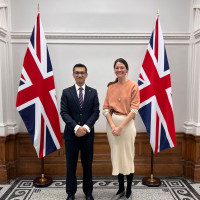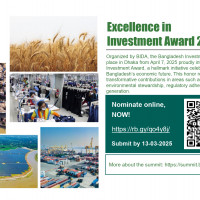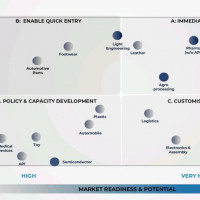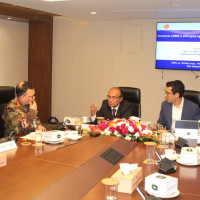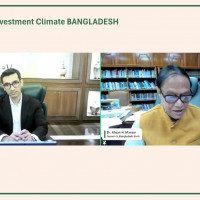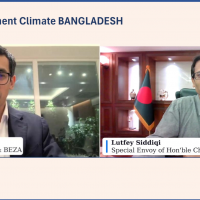Chief Adviser's Office
Media Release
2nd State of Investment Climate: Q&A with Bangladesh Bank Governor
Dec 02, 2024
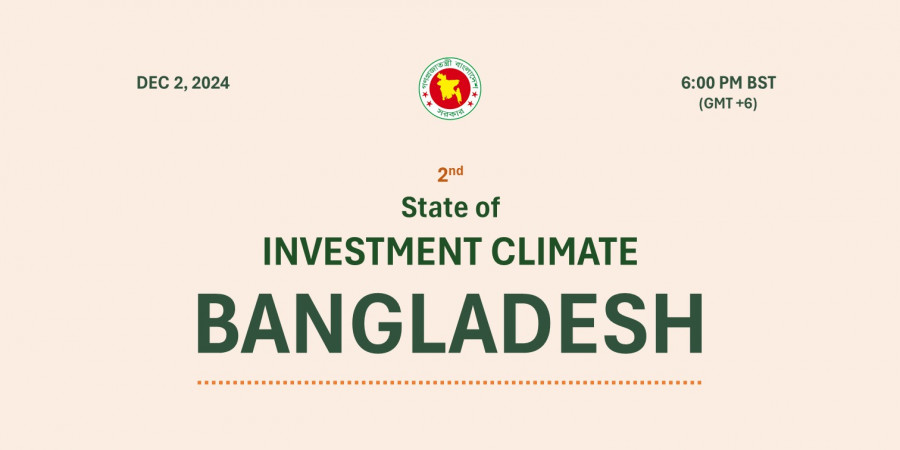
On December 2, the Bangladesh Investment Development Authority (BIDA) held the second session of its State of Investment Climate webinar series. The event featured Dr. Ahsan H. Mansur, Governor of Bangladesh Bank, as the Guest of Honor, alongside Ashik Chowdhury, Executive Chairman of BIDA and BEZA. Below is the full transcript of the webinar's Q&A session.
BIDA-BEZA EC: Thank you, sir, for coming. I'll start with a very topical and timely question: How does the central bank plan to address the concerns raised by Moody's in its recent downgrade and enhance investor confidence?
BB Governor: Thank you, and let me welcome all investors, potential investors, and others interested in Bangladesh. Welcome to this session.
This government is emerging from a crisis situation. We had what you call a "perfect storm" that needed to be overcome. On one hand, we had a balance of payments problem. We started with that. We had declining reserves and a depreciating exchange rate. Additionally, the balance of payments deficit was significantly negative across almost all indicators - be it the current account, financial account, or overall deficit. Domestically, inflation was very high, and to make matters worse, there was systematic robbing of banks that left several banks - at least eight to ten - vulnerable.
These were the initial conditions, and they didn’t develop overnight. It is important to highlight that this downgrade by Moody’s should not have occurred now. This whole thing happened before this government came to power or the economy reaching its current state.
When the downgrade was announced - for instance, on the balance of payments front - the exchange rate had stabilized and remained steady over the past several months. Secondly, because we are no longer selling dollars, our foreign exchange reserves have stabilized. So, the decline in reserves has been fully arrested.
Thirdly, the overall balance of payments has improved. The current account, which previously had a large deficit, is now virtually balanced. The financial account, which had a deficit of about $1.5 billion, has turned into a surplus of $500-600 million.
Thirdly, overall balance is still slightly in deficit, primarily due to issues carried over from the previous regime. However, this deficit has improved by more than a billion dollars.
While the overall balance remains slightly in deficit, this is primarily due to issues carried over from the previous fiscal year. However, even this deficit has improved by more than a billion dollars.
Our primary objection to Moody’s assessment is that the downgrade was issued at a time when the economic outlook is improving, yet the report suggests a deterioration. We formally dissented from Moody’s evaluation, emphasizing that they seem to be driving while looking in the rearview mirror instead of the windshield. While setting your outlook, you should be looking in the front view of the car, not in the rearview mirror for long. You are reporting something that has happened in the past, while things are changing significantly from the external side, which is the prime concern. So, that will be my initial reaction to Moody's downgrade.
We think that the inflation concern is also being addressed. Monetary policy has been significantly tightened, well beyond what was called for by the IMF. In fact, the IMF will concede that we are multi-steps ahead of their suggested measures.
We have increased policy rates considerably, liberalized interest rates, and interest rates have risen significantly. These measures have made the taka a more attractive asset, offering returns of 12%-14%, far higher than what can be earned on the US dollar. The stability of the exchange rate has turned it around. That's why we're seeing this positive inflow on the financial account. We deliberately tightened monetary policy and strengthened the taka as an asset class to stabilize the exchange rate, which serves as the cornerstone for reducing inflation in Bangladesh.
We have neutralized potential external shocks through exchange rate stability and outlook on the global commodity market side is very, very comfortable. Petroleum prices have declined and food prices in general are lower than what they used to be. So, we feel very comfortable that inflation is going to come down in the coming months.
Additionally, we undertook different side-measures. We are coordinating with the fiscal side, basically, the fiscal policy to reduce government borrowing from the banking system so that more credit can be made available for the private sector to regenerate supply. For example, we have noticed that raw material imports settlement or LC settled in the last four months is 10% above the last year, compared to a 15% decline last year.
So, think about this turnaround. And, what is Moody's saying? Their story is completely outdated. In our formal response to them, we urged their team to visit Bangladesh and assess the situation firsthand. Don't sit in Singapore, listen to narratives from somewhere else and write your story. You will be behind the curve. So, I think we are making significant progress on the macroeconomic front. We will come out of these three challenges that I mentioned up front and the new outlook should reflect that.
So, I would stop at this. Thank you.
BIDA-BEZA EC: Thank you, sir. You talked about the tightening. How long do you foresee this tightening to continue in the short or medium run? Are we talking about months? Are we talking about years? What's your general view or feel at this moment?
BB Governor: We have started the tightening experience in the post-COVID period for most of the central banks - US, UK, India, Thailand, and several other East Asian countries. What we have noticed is that once the tightening starts - say from when the inflation is 10% or more, that is when you start the tightening. By the time inflation rate comes down to 3% or 2%, depending on their target area and the speed of tightening, it normally takes 12 months to 18 months. I plotted them and that's what I have seen.
So, in our case, what should I expect? Given the relative stability of the exchange rate, given that this monetary tightening started in the month of May, I would say by May-June, it will be 12 months. I would think that by May-June, we should have inflation coming down to 7%, and perhaps in another few months, it will be to 6% or 5%.
So, when that happens, we will certainly - once halfway through that - we're not going to tighten in monetary policy any further. We're waiting to see the signals of the market. If inflation doesn't go up significantly in the coming months, we will remain on the pause. But my expectation is that in two months' time, or even one month's time, we should start seeing the headline inflation coming down. Let me also take note of this: the non-food inflation is already down for the third consecutive month. It first came down in the month of August, then it came down in September - then it came down modestly, but it came down steadily. So, what I'm saying is that things are working.
The reason the food inflation is high is because we had two floods, and a very long rainy season, which prevented the winter crops and winter vegetables and many other agricultural products from reaching the market - like onions, potatoes and so on and so forth. So, food prices are on the decline now, and I would say, some of these will be collapsing in the next two months. Because there will be so much potatoes coming in the market in two months' time that we will have potatoes rotting in the field. That is my prediction. This is how agricultural crop cycles work. Unfortunately for farmers, they will not get their money next time. But I must say that the rural economy is getting the benefit of these prices. They're getting the highest prices for paddy, potatoes, and any crop that they have now in this scarce time. They're getting good return and they're very happy. Of course, the consumers are not happy. I hope this complaint will also be over in about 5-6 months' time. At that time, we'll be unwinding this tightening monetary stance, bring down the interest rate. Along with the decline in inflation, we hope that the external sector will also stabilize.
I must make two points here. On the external side, these two factors are working in our favor. Despite all the noises you hear about unrest, industrial unrest and the garment sector, our export - which is 86% RMG driven, increased by 10% in the last four months. So that's one thing you must take note of. Despite the revolution, and all the industrial unrest, exports are growing. In the month of October, exports grew by 20 percentage points. That is a huge boost to our balance of payments. If you look at remittance, it is up by 28.5% in the last five months - that is from July to November. So, we are seeing a turnaround in the balance of payments situation.
On the supply side, external constraint imposed by the balance of payment problem is being relieved. People can open LCs now. We have reduced payment arrears, that is accumulated LCs opened but not settled from $2.5 billion to $454 million. So, what is in this $454 million? They are not normal payment arrears. They are related to companies which are not properly operating like S Alam Group, Beximco Group and so on and so forth. They account for a large part of the remaining arrear. Then we have some power arrears. We are working to bring down the remaining external payment arrears to zero. Hopefully, we should be able to do it in a month or so.
BIDA-BEZA EC: Thank you, sir. So, the inflation, as you have been trying to tackle it, is very commendable. And a lot of people consider the tightening of inflationary policies as a contradictory measure for economic growth. So, how do you see that? How does Bangladesh Bank navigate or keep the balance between inflationary policies to tighten them at the same time, not make sure that it doesn't stifle economic growth?
BB Governor: Let me emphasize one thing. Yes, we have increased the interest rate. We know that it hurts businesses in some way. But our statistics is very clear. When Bangladesh Bank or the previous government kept the interest rate fixed at 9% maximum, did they get investment in Bangladesh? Answer is no. When was the best time for investment in Bangladesh? It was in 2014, 2015, 2016, 2017, when lending rates were at the level of 16%, 17% or 15%.
So, it is not the interest rate that is the single largest deterrent for investment in Bangladesh. In Bangladesh, there are many other non-economic factors, which you are dealing with yourself. So, you know it better than me that there are many numerous non-economic factors to be addressed. And those are more important factors than financing. But nevertheless, I'm aware and in terms of growth, we are very much confident. The World Bank, IMF, ADB - everybody is saying growth will be at least 4.5% to 5%. So, it is not a small growth. It's a moderate growth in the context of Bangladesh because we are used to having 6.5% as one. But 4.5% under this kind of situation, I'm happy with that.
With that growth and with the balance of payment problem easing, I'm looking for a very strong rebound in the next fiscal year. That'll have a lasting impact on our economy and employment generation. I hope that the business community will understand that. Investors will accept this explanation and give us the time for our economic policies to muddle through this system and give us the desired results.
BIDA-BEZA EC: Thank you, sir. You talked about employment. So maybe we slightly switch gears to that. So, one of the questions I have here is, the SME financing gap is estimated to be USD 2.8 billion in Bangladesh. Why does the banking sector continue to have such a conservative lending practice?
BB Governor: This is the unfortunate part of our banking sector performance. It has been largely urban-centric in the past. But there are exceptions, for example BRAC Bank. When I was the chairman of BRAC Bank, it was 36% SME lending. It was still an SME-dominated bank. It increased to 54% when I left. But that is not a standard case. Many banks, particularly the foreign banks, for example, they don't even touch the SMEs. They don't want to go to that sector. They prefer trade. So unfortunately, still the preference is for trade and industrial investments. The problem with respect to industrial investment is the mismatch of assets and liabilities. Because you have deposits which are short-term, but you are lending very long-term - 7 years, 10 years or 15 years. That is not congenial. You didn't develop the bond market for long-term financing. So, all financing is being done by the banking system. A part of the problem of the banking system is that we are too dependent on debt financing rather than equity financing. So, this is a medium-term issue that we also need to address.
So, we hope to muddle through and work it out. Thank you.
BIDA-BEZA EC: Thank you sir. What key steps is Bangladesh Bank taking to restore trust in the Bangladesh banking system?
First and foremost is to improve the governance of banks. There were a number of banks which were badly governed. A single family controlled about seven banks and three non-[banking] financial institutions, which is completely against the rules of Bangladesh Bank. But it happened. They did it through the political support and blindly, not looking at the rules of the central bank. That time is over. So, governance has improved, and that's the first thing we have done.
Secondly, we have created three task groups, one is looking at the asset quality. This is being conducted with support from the World Bank and the Asian Development Bank. This asset quality review of banks is going to start in early December, well in a week's time and that will be followed by asset recovery as well, which is being undertaken by another task group.
We have a third task force which will be looking at strengthening the operations of the Bangladesh Bank, focusing on compliance in inspection, supervision, regulatory issues and enforcement. So that way we believe that the banking sector will have a turn around.
Yes, we have some serious issue of recapitalizing some of these banks but we don't believe that's going to be a systemic problem. It is a problem that we can contain and it is only limited to Islamic banks. The largest Islamic bank has grown out of the liquidity pressure and for the other banks we are supporting them with liquidity. We hope many of them will come out through that process. We are also undertaking regulatory reforms for Bank Resolution Act - now almost complete and being reviewed by the World Bank and IMF. Once that review is complete, we will submit it for adoption and that will give us lot of flexibility in terms of resolving the issues related to banks. So, it'll be costly, it'll take its time but we will definitely leave behind a much stronger banking system, a much more accountable banking system, much more regulation-wise-compliant banking system for the coming years.
BIDA-BEZA EC: Thank you sir. We have time for one more question. This is a good question to probably try to tie the knot, which is: What is Bangladesh Bank’s vision to facilitate inbound investors or the question that can be refreshed to say what is Bangladesh Bank’s plan or vision to facilitate increased FDI into Bangladesh?
BB Governor: Thank you. I think BIDA is making good efforts to ease investment problems and Bangladesh Bank is part of it. This is a small example but let me just say that if you want to repatriate your profits, dividends or royalties, you no longer need Bangladesh Bank’s permission. We have taken our hands off. We basically said, there are rules and regulations, and AD banks have the authority to remit any amount of money following the rules. So, it is left to the banking system, based on bank-client relationship.
What we are trying to do is that any sanctioning of hard loans, we are easing it up. OBU operations of the banks, we are easing it up. We have already taken out fund transfer restrictions between OBU and DB. We are trying to promote investment. Any investment proposal coming to us, which are from credible sources, we are approving right away. We have also agreed with BIDA that small loans and things like that can be processed there [by BB officials stationed at BIDA]. You don't even need to come to us. We need to simplify these things.
We want to liberalize our capital transactions process, investment regime and the best thing we can do to help the investor is to ensure our macroeconomic stability, higher growth and reserve build-up. Those will give the assurances of profitability and profit repatriation. From the investment perspective, these are important considerations and Bangladesh Bank fully understands the concerns of investors. We are fully committed to resolve problems so that they can happily do business in Bangladesh.

